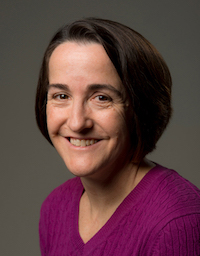Swimming Toward Solutions
Gayle Zydlewski migrates from fisheries biologist to director of Maine Sea Grant
Gayle Zydlewski was a participant on the interdisciplinary Sustainability Solutions Initiative (SSI) research team—the $20 million National Science Foundation project that led to the creation of the Senator George J. Mitchell Center for Sustainability Solutions.
Prior to her participation in SSI, Zydlewski concentrated her research on fish biology in UMaine’s School of Marine Sciences. But with SSI, she began to see a bigger and more diverse world to which she could apply her research, a world that included social science and issues that mattered deeply to people and communities.
Does her journey from fisheries biology to Maine Sea Grant surprise her?

“Yes, particularly because early in my career I went into working on fish so I wouldn’t have to deal with people. Now, the work is all about people,” Zydlewski says. “I’m still studying fish, but the work now focuses on how that intersects with what people are doing and what matters to coastal communities.”
She adds, “The SSI work enabled me to collaborate with social scientists who actually studied how we did our research on the fish side of things, after which I saw the value of that research for understanding how it made an impact in certain communities in different ways.”
So it was natural that Zydlewski’s journey led her to a leadership role at Maine Sea Grant, whose mission is making a difference in coastal communities through research, education and outreach to people on the ground.
“Over time, making a difference for people in Maine communities has become a keen interest of mine,” she says. “It was definitely strengthened by the interactions I had with people from other disciplines and it was SSI that really fostered that.”
In 2009, Zydlewski started a research project that focused on the potential impacts on fish interacting with tidal power devices, which in turn meshed with the project she undertook as part of SSI, “Renewable Energy from the Tides.”
“My initial project was focused exclusively on how fish interact with tidal turbines, and it had no social science element,” she notes. “Fortunately, the SSI project provided an opportunity to expand the scope of work and include social science researchers.” She adds, “That became a real pivotal point in thinking about where my own research could make a difference for people and communities.”
What the social scientists did was study the actual process taking place—how the fisheries scientists were interacting with fishermen “to see whether they were aware of the data we were collecting, and how it could be useful and make a difference to them,” Zydlewski says.
Prior to that, there was virtually no interaction between the two groups. “But once we started doing the research, we took it to heart to really build that trust and have a relationship with these folks as we moved into the next phase,” she says.
And building relationships is what Sea Grant is all about. Says Zydlewski, “Sea Grant makes a conscious effort to be an honest broker, which can be really difficult. But at the same time, I find that really valuable because we try to engage as many people on all sides of an issue as we can to generate solutions to problems.”
“To me that’s something that’s more of a listening role, and that’s been a shift for me. I’d say I learned some of that through SSI. Sea Grant really tries to take a step back and not advocate, but rather find common ground as much as possible.”
—David Sims
